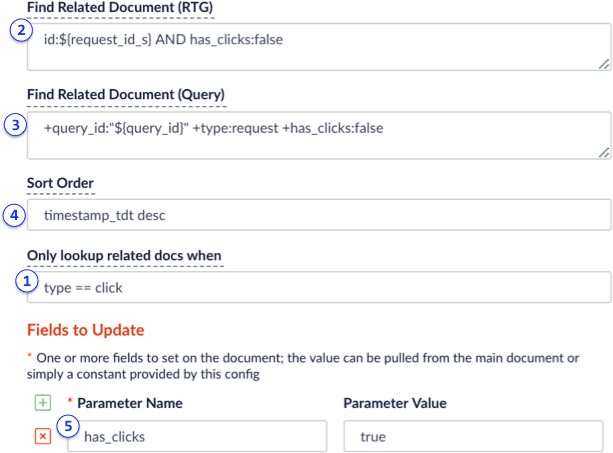_signals_ingest unless you specify a different index pipeline.
The _signals_ingest index pipeline has five stages:
- Format Signals stage
- Field Mapping stage
- GeoIP Lookup stage
- Solr Indexer stage
-
Update
has_clicksflag stage
The Updatehas_clicksflag stage is an instance of the Update Related Document stage that updates thehas_clicksflag to “true” on an existing request signal after the first click signal is processed for the request.
- When a click signal is encountered (type == click)
- Look at the incoming click signal for a field named
request_id_s, which gets set by the Format Signals stage using a distributed cache of recently processed request signals.
If therequest_id_sfield is set, then send a real-timeGETquery to Solr to find a request signal with ID equal to the value of therequest_id_sfield on the click signal. To avoid re-updating request signals, the RTG query also filters onhas_clicks==false, which avoids duplicate atomic updates on the same document in Solr. Real-timeGETis used to avoid timing issues between a request signal being sent to Solr and when it gets committed. This prevents missing updates when clicks occur soon after the initial request signal is sent by the search app. - If the click signal does not have the
request_id_sfield set, then do a normal Solr lookup for the request signal using:+query_id:"${query_id}" +type:request +has_clicks:false. A click signal may not have arequest_id_sif there is a cache miss in the distributed cache used by the Format Signals stage. - If the stage performs a normal query, there may be multiple request signals that have the same
query_id. This is because thequery_idis based onsession+query+filter, so if a user sends the samequery+filterduring the same session, there will be multiple request signals with the samequery_idvalue. Thus, the stage sorts to get the latest request signal to update. - If a related document is found (in this case a request signal), then the stage updates the
has_clicksfield to true and performs an atomic update in Solr.